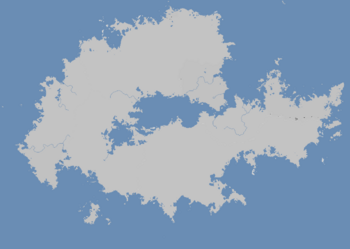Azura
This article is incomplete because it is pending further input from participants, or it is a work-in-progress by one author. Please comment on this article's talk page to share your input, comments and questions. Note: To contribute to this article, you may need to seek help from the author(s) of this page. |
The Evenguard of Azura La Pariguardia di Azzurra | |
|---|---|
| Motto: Un Fiore al Colosso (A Flower to the Colossus) | |
| Anthem: Gloria ad Azzurra (Glory to Azura} (Lyrics to Glory to Azura) | |
 Map of the Evenguard in Esvanovia | |
| Capital and largest city | Raevenna |
| Official languages | Azuri |
| Ethnic groups |
|
| Demonym(s) | Azuran Azuri |
| Government | Matriarchal Directorial Parliamentary Single-Party Republic |
• Prima Istitutrice | Guilia Trevisani |
• Seconda Istitutrice | Silvia Luoni |
| Legislature | Congregazione Nazionale |
| Consiglia Suprema del Collettiva | |
| Consiglia del Deputati | |
| History | |
• Cirazuran Cultures | Circa 3000 BCE |
• Raevennic Empire | Circa 2500 BCE - 105 CE |
• Raevennic Republic | 105 CE - 1792 CE |
• Lorist Revolution | 1792 CE - 1801 CE |
• Directorial Republic | 1801 CE - Present |
| Area | |
• Total | 15,629,550 km2 (6,034,600 sq mi) |
• Water (%) | 14.25% |
| Population | |
• 2020 census | 775,250,500 |
• Density | 49/km2 (126.9/sq mi) |
| GDP (nominal) | 2020 estimate |
• Total | $42.250 Trillion |
• Per capita | $54,498 |
| Gini | 25.325 low |
| HDI | 0.912 very high |
| Currency | Azuran Marca (ɱ) (AZM) |
| Date format | dd-mm-yy |
| Driving side | left |
| Internet TLD | .azr |
Azura, officially the Evenguard of Azura (Azuri; Pariguardia di Azzurra) is a sovereign island country located in western Esvanovia. It is surrounded by the Mare di Giada, which serves as its natural borders and a buffer from extant threats. It is a highly populous country with a total population surpassing 775 million as of the 2020 national census. The country is comprised of seven Communes and one special administrative district surrounding its capital and largest city, the historical city of Raevenna.
Modern scholarship debates the origins of life on the Azuran subcontinent; most scholars believe that the first Azurans arrived in the form of Aquilonian seafarers around 3000 BCE.

